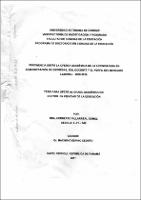Pertinencia entre la oferta académica de la licenciatura en administración de empresas, rol docente y el perfil del mercado laboral. 2008-2010.
Resumen
Este trabajo enfoca la problemática sobre la pertenencia de la oferta académica de la Licenciatura de Administración de Empresas con una visión sistémica y renovada a la luz de las tendencias de la Educación Superior, según la UNESCO y de las experiencias de intervención del mercado laboral, atendiendo a las particularidades del diseño curricular y sus procedimientos de índole técnico, social, institucional y participativo que requiere un profesional para ser competente a lo largo de toda la vida. Un gran énfasis se le ha asignado al diseño curricular por competencia como eje organizador del perfil profesional, considerando los factores de mercado, tecnología, la correcta identificación de beneficiarios y las normas y principios que rigen la educación superior en América Latina, a fin de maximizar el impacto hacia la pertinencia de esta oferta académica.
Con el propósito de facilitar la comprensión de conceptos y la aplicación esta tesis como diagnóstico evaluativo; se incluye una guía metodológica para la capacitación de los profesores de ta Escuela de Administración de Empresas reorientada al rediseño del currículum por competencia, según el proyecto Tuning y modelos alternativos que determine la Institución. Debido a que se confirmó mediante una evaluación del desarrollo del currículum, el entorno empresarial y el desempeño del egresada, la falta de pertenencia y obsolescencia en tos contenidos del plan de estudio, deficiencia en el manejo de la tecnología, la poca disponibilidad de recursos didácticos y audiovisuales, dominio del idioma inglés. entre otras debilidades que afectan la calidad del egresado de esta carrera y del sector productivo. This work is focused on the academic offers problems of relevance with the Business Administration Bachelor with a systemic and renewed view for the trends in the Higher Education, according to UNESCO and the experiences of the labor market intervention, which is in charge on the specific curriculum design and its technical, social, institutional, and participatory procedures that a professional requires to be competent throughout life.
A great emphasis has been given to the curriculum design by competition as the central organization of a professional profile, considering all the marketing factors, the technology, the correct benefices of identification and the rules and principles that govern the higher education in Latin America, to maximize the impact relevance for the academic offers.
In order to facilitate the meaning of concepts and the applications, this diagnostic evaluative thesis included a methodological guide for the training of teachers of the Business Administration School, refocused on the curriculum redesigning by competition within the Tuning project and alternative models that the institution will determine. Because it was confirmed by an assessment in the curriculum development, the business environment and the graduates performance, the irrelevance and obsolescence in the content of the curriculum, the deficiencies in the management of technology, the Insufficient availability of teaching resources and audiovisual, the English proficiency, among other weaknesses that affect the quality of the graduates of this career and the productive area.

